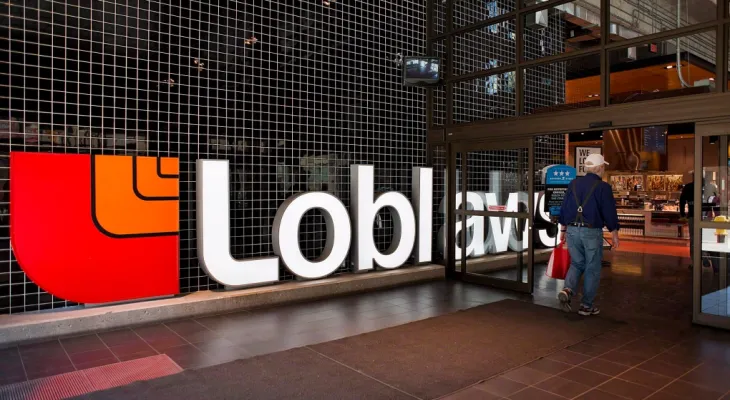Search here
Newspaper
Search here

Arab Canada News
News

Published: April 29, 2024
The boycott targeting Loblaw is gaining momentum online, as thousands of shoppers prepare to take their money elsewhere in May.
It is the latest sign of growing frustration among Canadians towards major grocery stores, which have been under political and public scrutiny due to rising food prices and profits.
Emily Johnson, a mental health and addiction worker in Milton, Ontario, and one of the organizers of the boycott, said, "We don't want to struggle anymore."
Johnson and others began organizing the boycott after a Reddit group they created gained thousands of followers looking for a place to complain about Loblaw and other grocery stores.
The page r/loblawsisoutofcontrol now has around 56,000 members. Although there's no way to know how many people will participate in the boycott, the page is filled with posts from people saying they plan to do so, or that they have already started. There’s also a list of demands directed at Loblaw from the boycott organizers, which includes signing grocery conduct rules and committing to fair prices.
Johnson stated that the main goal is to have a financial impact on Loblaw, the largest grocery company in Canada. However, she also hopes that the boycott will help educate people and draw government attention.
Rahul Mehta, a resident of Mississauga and community advocate, has already been trying to cut back on shopping at Loblaw-owned stores, planning to boycott the company entirely in May.
He hopes the boycott will push shoppers not to other big grocery stores, but to independent local shops.
He said, "I think we could see a resurgence... in interest in learning and demanding real options, not just Metro versus Loblaws."
Monica Laparage, an assistant professor at Queen's University studying food accessibility and consumer welfare, noted that consumers increasingly feel powerless regarding the lack of choices available to them, especially in small communities.
She added, "It is unlikely that Loblaws... will change its core business model as a result of the boycott."
She continued that this doesn’t mean the company isn’t paying attention, mentioning that the grocer recently backed down from a controversial change in its discounts on products nearing their best-before dates after public protest.
For his part, Loblaw's CEO Per Bank said the company cares about its customers and sees them trying to offset inflation by seeking sales, buying more private-label products, and shopping at discount stores.
In an interview, he stated that the grocer is responding to these changing behaviors through new promotions and expanding discounts.
He added, "Loblaw has to keep looking for ways to provide value to keep people coming back: 'We don’t have a contract with our customers. They can choose to shop elsewhere tomorrow if they don’t like the offer we present.'"
Bank confirmed he takes customer complaints personally, and if customers are not satisfied, “that’s something I want to fix.” He added that if a customer really doesn’t like Loblaw, “that’s a very large number.”
Laparage noted that the boycott's impact on the company might not be immediate, but it could accumulate over time if people's habits change.
She said, "Here lies the financial impact." "It’s the continuous loss of consumers over time, because it’s very hard to get them back once they leave."
Laparage stated that she believes grocers don’t fully understand "the extent of their customers' frustrations," and the risks this poses to their reputation.
Some participants in the boycott are loyal Loblaw customers, like Willeflirakers, who plan to give up not just Loblaw, but also Metro and Empire stores in May.
Flirakers said, "I’ve already switched to getting vegetables and fruits from my local family store."
She is unsure whether the boycott will significantly impact Loblaw’s profits, but she believes it could affect its reputation.
For Anne De Sequeira, the boycott has already begun.
She stated that the catalyst was Loblaw's move to reduce the level of discount on food items nearing their expiration dates.
De Sequeira, a Toronto resident who posts about food on TikTok, said she is engaging in a "soft boycott" of the other major Canadian grocery chains, but has completely cut Loblaw out of her life, canceling her PC Financial Mastercard and moving her prescriptions from Shoppers.
She mentioned that Loblaw has reversed a discount change it made, showing De Sequeira that if “consumers make enough noise about something, they must take action.”
The CEO admitted that Loblaw's reputation has been damaged since pre-pandemic times, stating that this is something the company is looking to rebuild.
He said it’s easier for customers to "point fingers" at grocery stores like Loblaw compared to other players in the supply chain or global factors causing price increases.
"Everyone knows Loblaws. Everyone knows our president (Galena Weston)."
"We are a much easier target, and we need to live with that and that’s okay."
Some people are uncertain about the boycott—some are unsure it will succeed, while for others, saying to boycott Loblaw-owned stores is easier than actually doing it.
This is true for Timba Hall, a resident of Halifax. The closest grocery stores to Hall are Loblaws and Sobeys, and she doesn’t have a car. But she knows others have fewer options.
She said, "Most people don’t have the choice or time or money to do that."
She and her husband will try to participate, at least partially. Although they can’t buy everything they need elsewhere, they plan to reduce their shopping at Loblaws.
Hall added, "I think what this planned boycott will ultimately prove is that they have us by the throats; we are unable to boycott them because they simply own too much of the stuff we need to live and work in the community."
"And that, if anything, should be a big red flag for the government that it needs to get serious about solving the problem."
Comments